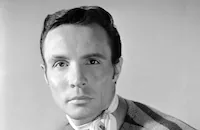Slogan
Cast & Crew
Pierre Grimblat
Serge Gainsbourg
Jane Birkin
Andréa Parisy
Daniel Gélin
Juliette Berto
Film Details
Technical Specs

Synopsis
Serge, a successful television commercials producer in his early 40's, travels to Venice to enter his films in a festival. Dissatisfied with his life and his marriage, Serge meets Evelyne, a pretty 18-year-old English girl, and makes her his mistress. He rents an apartment and lives with her while waiting for his divorce. Evelyne soon tires of him, however, and abandons him for a Venetian speedboat driver. In search of companionship and consolation, Serge picks up another young woman.

Director
Pierre Grimblat
Cast
Serge Gainsbourg
Jane Birkin
Andréa Parisy
Daniel Gélin
Juliette Berto

James Mitchell
Gilles Millinaire
Henri-jacques Huet
Pierre Doris
Crew

Film Details
Technical Specs

Articles
Slogan - SLOGAN - Serge Gainsbourg & Jane Birkin's 1969 On-Screen Love Affair on DVD
This is not to say that Slogan is a bad time au contraire!. Although the script is credited to Grimblat, Francis Girod and Melvin Van Peebles (fresh from writing and directing the Paris-set Story of a Three Day Pass), Gainsbourg and Birkin seem to be winging most of it. While their improvisations have an annoying navel-gazing quality about them they also make the prosaic goings on feel experimental and alive. Certainly, it's a tonic in this age of cosmetic surgery run rampant to see such unconventionally attractive people as the jug-eared Gainsbourg and the horse-faced Birkin canoodle in loving (and lovingly imperfect) close-up. When the scenario obliges the pair to stop looking so pleased with one another and actually act out the downward arc of this love affair, the drama becomes passably fine... although acting honors go to Andréa Parisy (The Mayerling), as Gainsbourg's long-suffering wife, whose stoic silences are the film's real heart and soul.
If unoriginal, Slogan is at least reverential, and film references are peppered throughout: the arrival of a steam train pointed into the camera seems to nod to the Lumière Brothers Arrival of a Train at La Ciotat (1895, which allegedly sent early cinemagoers scrambling towards the exits ahead of a presumed runaway locomotive; later, when Jane Birkin's character is introduced, her gingham headband and lap dog seem to reference Dorothy from The Wizard of Oz (1939). Grimblat even throws in a snippet from one of his earlier films, an Eddie Constantine shoot-em-up, as an diversion Gainsbourg's mercurial Serge Faberge screens for his pregnant wife. Remember that scene in Annie Hall (1977) where Woody Allen magically produces media guru Marshall McLuhan out from behind an art house cinema's potted fern to win an argument with a fellow cinephile? Grimblat gets something like a jump on Allen's classic bit of cinematic legerdemain by having Faberge dispense with annoying bit players by snapping is fingers and making them disappear. Gainsbourg himself supplies the infectious, airy and oh so au currant score, while cinematographer Claude Beausoleil (who years earlier as a lowly camera operator had bounced between assignments for Jean-Luc Godard and François Truffaut) captures some lovely location photography in Venice, Paris and the French countryside. Inessential but of historic interest and certainly charming, Slogan will likely endear itself to those already sold on the Gainsbourg-Birkin mystique.
Long unseen and arguably overdue on DVD, Slogan has been released by Cult Epics in a bare bones package with only a theatrical trailer as a bonus feature. Letterboxed at 1.66:1 (non-anamorphic), the image is reasonably clear and colorful, betraying a degree of grain consistent with a cheaply made film of its vintage. Transferred from European sources, PAL to NTSC conversion artifacts will be noticed by more discerning viewers. The two-channel monaural soundtrack is acceptable and occasionally maladroit English subtitles (which refer to Birkin's character as a "homebreaker" when they probably mean "homewrecker") are optional.
For more information about Slogan, visit Cult Epics. To order Slogan, go to TCM Shopping.
by Richard Harland Smith

Slogan - SLOGAN - Serge Gainsbourg & Jane Birkin's 1969 On-Screen Love Affair on DVD
Quotes
Trivia
Notes
Opened in Paris in August 1969; running time: 90 min.














